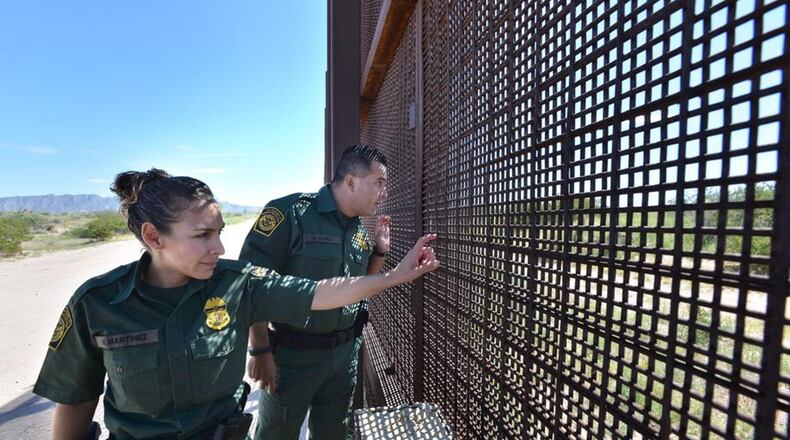Five Georgia companies are among more than 200 nationwide that have signaled interest in helping build President Donald Trump’s signature campaign promise: A “great, great wall” on the U.S.-Mexico border.
Located in the Atlanta and Augusta areas, the Georgia businesses include construction companies, an engineering firm, a building industry recruiter and a defense contractor. All have added their names to an online federal list of vendors interested in competing to design a prototype for a concrete border wall. Proposals are due Tuesday.
IN DEPTH: Amid Trump crackdown, fear sets in among Atlanta immigrants
MORE: Here is every executive order President Trump has signed
Trump says the wall will help curb illegal immigration and boost national security. Estimates for extending the existing barriers along the southwest border — there are already about 700 miles of various walls, fences and other barriers there — range as high as $21.6 billion. Critics call the proposal a divisive and colossal waste of money, noting that a large share of those who are here without authorization did not sneak across the 2,000-mile border but instead came here legally and then overstayed their visas.
Tensions over the project are so high that a Hispanic-owned construction company based in Fort Worth, Texas, has received death threats for pursuing it, The Washington Post reported last week. Several Democratic California state lawmakers introduced legislation last month that would require their state’s pension funds to divest from companies involved in building the wall.
Two sets of solicitations have been issued: One requesting a prototype for building the border wall with concrete. The second one asks for a design using other materials. The government plans to pick winners this summer. Those selected will be responsible for designing and building 10 feet by 10 feet mock-ups in the San Diego, Calif., area.
The government’s requests for proposals call for the wall to be “physically imposing in height,” or at least 18 feet tall. It should be able to resist sledgehammers, pick axes and chisels for at least an hour. The wall should be able to prevent tunneling at least six feet down. And its north side should be “aesthetically pleasing in color.”
The list of interested vendors includes companies that ultimately might not submit bids. Some are seeking subcontracting jobs, while others are monitoring the project for future opportunities.
Osprey Management, a small Sandy Springs-based construction company, is planning to submit a proposal by Tuesday’s deadline. If it wins the contract, it would team up with another engineering and construction firm to do the work, said Osprey’s owner, Kelvin King.
A former U.S. Air Force contracting officer, King said he sees the project as a business opportunity and would not “let my politics get involved.”
“Regardless if you like it or not, it is going to go forward, it sounds like,” said King, whose company has done work for local, state and federal government agencies. “I have no idea or thoughts or influence on where it goes. But right now, it looks real. And if it looks real, we have real ideas.”
C4 Planning Solutions — a defense contractor based outside of Augusta — is hoping to team up with another company for the opportunity. C4 has done extensive border security work overseas, said Rick Glover, who directs C4’s surveillance system division.
“Our background is pretty strong in surveillance systems, especially on borders,” he said.
Three other Georgia businesses — ACC Construction Co. in Augusta, Synergy Professionals in Peachtree City and Thompson Co. in Norcross — are also on the list of interested vendors.
While the border wall is politically divisive, it could also be a boon for business, said one marketing consultant.
Ken Bernhardt — who has worked with such big name brands as Coca-Cola, Chick-fil-A and Home Depot — said there is a “huge upside and a very small downside” for firms pursuing such a project.
“Obviously, it’s a huge opportunity to generate a lot of revenue for a firm,” said Bernhardt, who has taught marketing at Georgia State University. “And if a firm were to get this project, it would be what we would typically call a ‘badge project,’ meaning it’s one that they would tout to others, demonstrating their capability to take on a massive project.”
On Capitol Hill, meanwhile, Trump’s proposal continues to be a lightning rod — so much so that it threatens to prompt a shutdown showdown later this month. The president is looking for what amounts to a down payment on the wall in the spending bill Congress must pass by April 28 in order to ward off a partial government shutdown. The Trump administration is requesting $3 billion in extra border security money, roughly half of which would go toward jump-starting construction on the wall.
TRAVEL BAN: Georgia’s Ellis Island braces for Trump’s executive order
MORE: Atlanta ranks high in number of unauthorized immigrants
Democrats insist they will block any government spending bill that includes such construction money. They have some leverage here — Republican leaders will need their votes in the Senate and likely the House, since many members of the conservative Freedom Caucus tend to vote against all appropriations bills.
“It is truly a poison pill,” Senate Minority Leader Chuck Schumer, D-N.Y., said of the border wall proposal in a recent floor speech.
Some Republicans say their leaders should go to the mat now for this proposal to help Trump follow through on his campaign promise and force Democrats, some of whom backed a border fence during the George W. Bush administration, to go on the record.
No decisions have been made at this point, but some senior GOP lawmakers have signaled they could defer the standoff with Democrats until at least later in the year. Their logic is that a shutdown would be a publicity nightmare on the heels of the collapse of the GOP health care bill that could tarnish Trump at the tail end of his first 100 days in office.
One of the biggest issues surrounding the wall is that there are few clear estimates about how much it would cost. Trump on the campaign trail estimated it would come with a price tag of about $8 billion. He later said the cost would be closer to $12 billion. Republican leaders in Congress have said the price would likely be somewhere in the range of $12 billion to $15 billion, but Reuters, citing an internal report from the Department of Homeland Security, later put the total higher, at as much as $21.6 billion.
During the campaign, Trump insisted that Mexico would cover the costs, a prospect that Mexican leaders have rejected repeatedly. Trump later said Mexico would reimburse the U.S. for its expenses.
R. Gil Kerlikowske, who served as commissioner of U.S. Customs and Border Protection in the Obama administration, pointed out that apprehensions along the border have fallen significantly in recent months. He also highlighted how many of the people illegally crossing the border are immediately turning themselves in to authorities because they are seeking asylum. He added the Trump administration will face obstacles in extending the wall along the Rio Grande Valley, given private property rights and the ever-shifting river there.
“Repair and maintenance is very expensive on what we have in place now,” said Kerlikowske, a fellow at Harvard University’s John F. Kennedy School of Government.
U.S. Sen. Johnny Isakson said he supports the border wall proposal, noting it was a major Trump campaign promise. He warned against a federal shutdown on the issue.
“I’ve never seen a shutdown that made a lot of sense,” he said. “I think the threat of a shutdown is just that — it’s a threat. It didn’t work for (former U.S. House Speaker Newt) Gingrich and it didn’t work in any of those potential shutdowns since then. I don’t think it would work now. The thing to do is do your job — pass your appropriations bills on time.”
Keep Reading
The Latest
Featured





